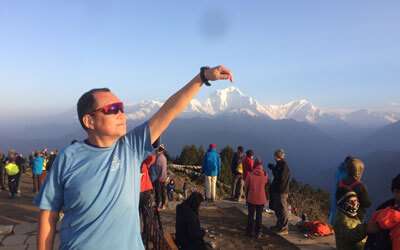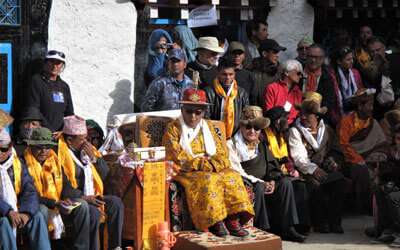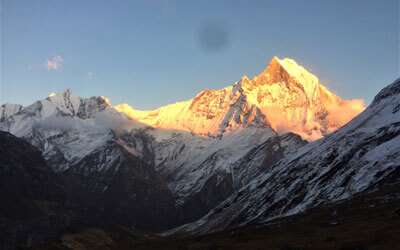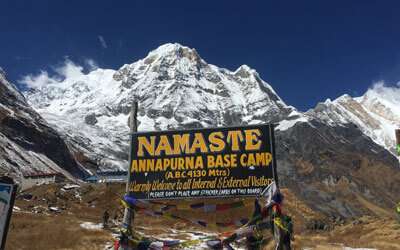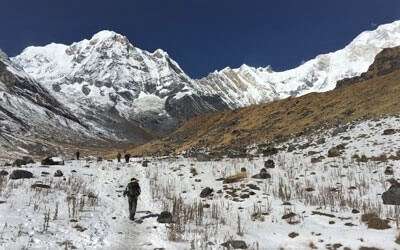IN KATHMANDU
All of our treks in Nepal start with at least one day in Kathmandu. On arrival, you should proceed through Customs / Immigration. Once you have passed through Immigration please collect your baggage and proceed through the exit point where you will meet HIMALAYAN DYNASTY representative with the company’s’ CLIP / SIGN BOARD to welcome and transfer you to the designated hotel in Kathmandu.
The hotel accommodation in Kathmandu and Pokhara will be on a twin bed sharing room in a 3-star hotel on bed and breakfast basis. Trek briefing will be organized in Kathmandu by your Group leader making sure all of the trekkers have proper gears and are prepared for their long-awaited adventure holiday. Should you have any queries feel free to ask your group leader or the hotel reception who are always pleased to assist you. Single supplements would be provided as per the requirement on a trivial additional cost. The evening will be highlighted by a traditional Royal Nepali food in a typical Nepal restaurant which would be a perfect event to get along with your group and break the silence.
Since we don’t consider drinking water straight from the tap to be safe, we request you to use boiled water or the mineral water provided in your rooms.
CULTURAL CONSIDERATION
Since Nepal has only been open to the outside world since 1951 and despite in the midst of great social transformation, Nepal still thrives as a very spiritual and conventional country. Though Nepali people consider foreigners as special guest yet they are expected to respect and respond to the Nepalese customs, social norms, and beliefs sensitively. Nudity and presenting of an intimate relationship are totally unacceptable. Typically, they greet with a ‘Namaste’ "Nah-mah-stay", it’s a gesture of greeting which is performed by placing our hands together to our heart and slightly bow our head. Namaste literally means "I bow to the divine in you".
Respect holy places – preserve what you have come to see, never touch or remove religious objects. When entering any Nepalese home, temples, and monasteries, always remove your shoes. When taking photographs, respect privacy – ask for permission and use restraint. Many Hindu temples may not be open to non-Hindus. Always ask permission before entering.
While giving or taking anything Nepalese use two hands which is a symbol of respect rather than doing it with just one hand. However, offering things to the begging children is highly discouraged because it only encourages begging. If you would like to donate to any school or charity organization, your group leader will always be there to guide you to do it in an appropriate method.
MONEY EXCHANGE
As for exchanging the foreign currency, you can either do it from the Banks or from any of the registered Money Exchange counters that we have in the Thamel area. However, we don’t persuade carrying too much cash due to the high probability of it being lost or stolen. Withdrawing money from the ATM is very preferable though the cash you receive from the ATM is always Nepali Rupees. ATMs can be the most convenient way to get at your money, again the downside is - they are not always a good value. There might be a certain amount of transaction fees you may have to face when using an ATM in Nepal.
There are normally no exchange facilities on the trek so your trek leader will be giving you necessary guidelines as to how much approximately you are to carry.
PERSONAL EXPENSES
The equivalent of USD15 per day per trekker is generally sufficient for personal expenses like Shower, Battery Charging, Ocassional Laundry and Drinks. We recommend you to carry about USD 300 additional as Emergency backup. The amount required in Kathmandu and Pokhara for meals, short exploration and transport would normally be covered by about US$ 40 per day. Shopping will vary greatly from person to person.
YOUR VALUABLE SAFETY: STORAGE:
While in Kathmandu please do not leave your room unlocked. If you are out on a short stroll or on any appointments, make sure to accommodate and secure your valuables – that can either be in your locked luggage or hotel safety deposit box.
Before we depart for our incredible adventure your leader will organize a safety store facility for your left luggage and the safety deposit box for your valuables that you wish to leave behind. However, please follow the hotel safety guideline over the loss of key to your deposit box. While trekking never leave your valuables unattained. It’s always safe to carry them on your daypack. Make sure to lock your Tea-House rooms while going out even if it’s for a short time period. In case of loss or theft please report it to the nearest police check post where you need to obtain a written report. In any such situation, your group leader would be the best person to talk to.
WEIGHT LIMITATION FOR YOUR TRIP:
20 Kilograms / 40 Pounds is the weight limitation for your Annapurna Trekking that includes your overall baggage weight (daypack and your luggage). You may bring more than specified extra luggage which can always be left behind at the Hotel safety store in Kathmandu or Pokhara. However, it doesn’t sincerely require to be an exact figure, 1 or 2 Kg extras per person wouldn’t make a much difference. Significantly, the porter luggage weight limitation is 30 kg / 66 pounds as one porter will be dealing with 2 duffel bags. So it’s always best to minimize your weight limitations. However, regarding what you need to bring carry with you is given in detail at our Trip Information page.
DRIVING FROM KATHMANDU TO POKHARA:
Driving from Kathmandu to Pokhara is one of the most remarkable experiences that you would perform while doing Annapurna treks with us in Nepal. We Normally start after breakfast around 8:00 in the morning from your hotel.You Group leader along will be accompanying on this sensational drive to the most beautiful lake city of Pokhara. Unlike Local or Public buses in Nepal, we will have the privillage of going with our own pace andstopping at desired places. The Drive is around 6 hours through beautiful countryside and we will take tea breaks and lunch breaks in the local restaurants along the way.
ACCOMMODATION:
Accommodation at Ghorepani Poonhill Trekking area is essentially in the tea-house that will be basic on twin bed sharing room with common toilets. Rooms with attached toilets and the single supplement will be provided depending on the availability as not all destinations in the Annapurna region offer a single supplement due to the limitation of tea-houses over the restrictions and obligations of National park rules and regulations.
FOOD:
In Kathmandu breakfast is included beside the welcome dinner in a Typical Nepali restaurant that would serve Traditional Royal Nepal Food. In the Ghorepani region, you have the option to choose your breakfast, lunch, and dinner with hot beverages from the menu that has multiple selections. However, your leader would recommend food variation depending on the availability as much as possible that is good for your health in the mountains, nutritious, plentiful, and tasty. In our entire trip, we will eat all the meals in the local Tea-houses including our lunch and our staff will make sure that your food is prepared with hygiene. We can also cater for specific dietary needs if you advise in advance besides our delicious mixture of Nepalese, Indian, Chinese, and continental food.
DRINKING WATER:
For Drinking, Himalayan Dynasty will provide you Boiled or Filtered water. The refilling will be done every morning at breakfast and every evening at dinner time. If you have about two waterbottles, it is generally enough. You may carry more if you feel like you need more. For environmental concern, we discourage our clients to use disposable plastic mineral water bottles on any of our adventure trips to Nepal. Just in Case you have to buy water we recommend you buying from Safe Drinking Water Stations set in all towns or villages in Annapurna Circuit trialfrom at minimal costs.
TIPPING GUIDANCE:
Tipping is an entirely personal matter. - It is also an indication of your satisfaction with the service delivered by our local trekking crew. As they work really hard to make your holiday the most memorable one, tipping is more like a token of gratitude of saying THANK YOU to your local crew. As a guideline average tipping is around 10% of your trip cost per trekker. Many people also like to donate various items of equipment to the porters and trek staff who would very warmly receive these items. Your Group Leader will make arrangements for a fair distribution of your gratitude and the used items (possibly by raffle) amongst the trek crew. We recommend you to make separate tipping for your trekking Group Leader.

